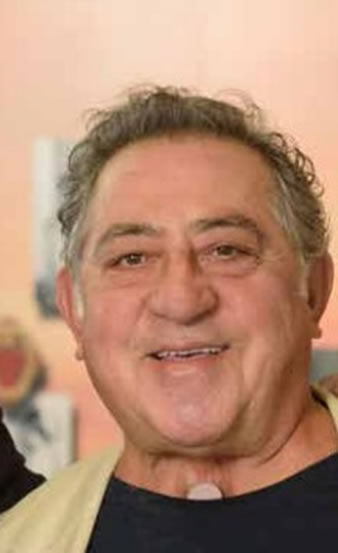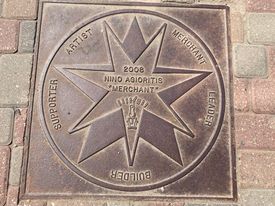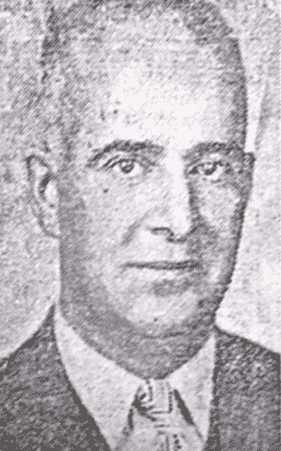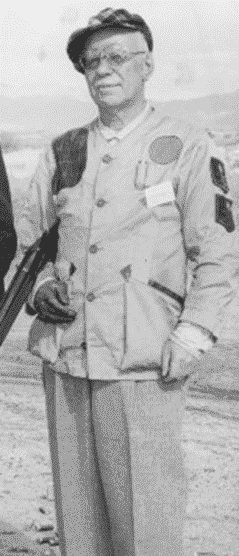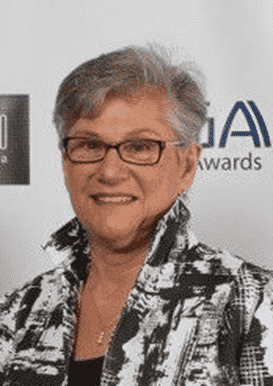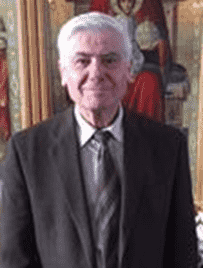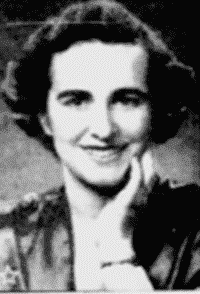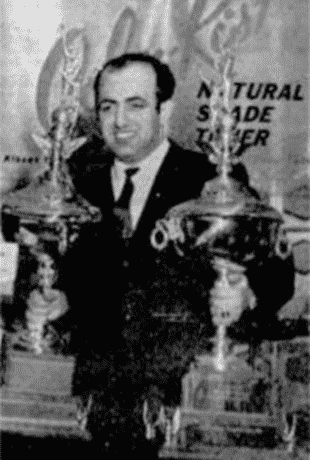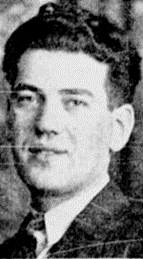Honours and Awards
Saskatoon’s History Through the Lives and Experiences of its Greek Community
Many people within Saskatoon’s Greek community have been recognized locally, nationally, and internationally with special honours and awards. This webpage celebrates their recognition and their connection to Saskatoon.
Honours and Awards

Agioritis, Ninos
Broadway Business Improvement District Greg Botting Walk of Stars
In 2008, the Broadway Business Improvement District (BBID) inducted Ninos Agioritis into its “Walk of Stars” in front of the Broadway Theatre in Saskatoon. In giving him this awareness, the BBID stated:
“Nino Agioritis has been synonymous with Saskatoon’s Broadway District for over 40 years. His extensive contributions to Broadway and the surrounding community during that time have been critical to the vitality of the area. His generosity and thoughtfulness have been key ingredients to Broadway’s success.”
Research Source: Saskatoon Star-Phoenix, November 25, 2008, p. 21.
Photo Source: St. Paul’s Hospital Foundation, “Spirit” , Winter 2016, p. 16
Barootes, Efstathios William (Staff)
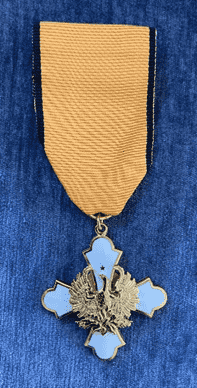
Awarded in 1995:
Efstathios William Barootes
The Order of the Phoenix is awarded by the Presidency of the Hellenic Republic to Greeks and foreigners who have distinguished themselves in the fields of public administration, science, arts and letters, commerce, industry, and shipping. It is also conferred on foreigners who have contributed to improving Greece’s stature abroad in these fields.
Two Greek Canadians from Saskatchewan have been honoured as officers of the Order of the Phoenix.
Chrones, James P.
James P. Chrones
James P. Chrones was awarded the Hellenic Red Cross Medal in July 1953. The Medal recognized his service to the people of Greece during World War II – specifically his leadership in northern Saskatchewan for organizing donations to provide food, clothing, medical supplies, and other forms of relief in Greece. The award was given by the King of Greece.
Girgulis, James
James Girgulis
James Girgulis was inducted in 1975 into the Saskatchewan Sports Hall of Fame as a builder in the sport of shooting. The following is the citation for his induction:
“Born in Kastron, Greece, James “Jim” Girgulis came to Saskatchewan in 1910 and took up trapshooting soon after his arrival.
Jim was active as a participant, administrator and coach. As secretary he was instrumental in the development of the Saskatoon Gun Club. Girgulis is a life member of the Saskatoon Gun Club, the Edmonton Gun Club and Amateur Trap Shooting Association. Girgulis maintains that his greatest achievement was coaching George Genereux to a gold medal in the 1952 Helsinki Olympic Games.
As a participant, Girgulis has an impressive record of personal successes. He was a member of the 1939 and 1941 Saskatoon Gun Club Trapshooting teams that won the Canada Team Trap Shooting Championship. These teams were inducted into the Saskatchewan Sports Hall of Fame in 1974. Throughout his competitive career, he has won every major trap shooting event in Western Canada.”
Source: Saskatchewan Sports Hall of Fame
“A Tribute to Shooter, James Girgulis, 1953”
By Cam McKenzie
ANY OLD TIME you want to talk trap or skeet shooting you can always find a willing partner in Saskatoon restaurateur Jimmy Girgulis, some 20 years ago referred to as “Dead Eye Dick the Greek” and still one of the country’s top scattergun artists. Right now, of course, Jimmy is all steamed up about the Saskatchewan championships to be held here next month when he expects a young chap by the name of George Genereux to set a similar pace, or even surpass the feats the old boy himself accomplished back in 1933.
Although he had many outstanding years at the traps, ’33 sticks out in Jimmy’s career as he was perhaps at the peak of his marksmanship. In those days if Girgulis missed as many as two birds he was having a bad day.
We recall seeing the Saskatoon Greek compete in a star-studded field of Canadian and American shooters in the Manitoba-Saskatchewan championships that year at the Winnipeg St. Charles traps. Fellows like Tom Harland and Tom Brodie, who then rated right at the top with the best trapshooters of the world, formed a portion of the opposition for Girgulis, but the Saskatoonian whipped them all.
He was the talk of the shoot on the first day when he ran 100 straight in the first half of the singles and upped his consecutive string to 150 the same day by taking the Shaunavon Trophy as well with another perfect 50, but Jimmy had to be sizzling in the singles for Brodie chased him’ down to the finish with 99.
The second day Girgulis dropped one bird in the closing 100 of the singles to take the title with 199 Harland wound up with 198, Brodie with 197. In the double’s competition, Jimmy was in the top with 94.
THEY STILL talk about the consecutive string of birds Girgulis pulverized in that shoot. He won the long run award, a phenomenal 288, and missed only nine of 400 targets, taking the high overall prize with 391. That year was also the start of the Mid-West International Shoot and Girgulis also made a clean-up in this event at Winnipeg, winning the singles, doubles, and handicap
Leading up to the Manitoba-Saskatchewan and Mid-Western shoots that year, Girgilus had a brilliant warm-up in the Saskatchewan meet, held at Manitou Beach, Watrous. In the provincial singles, he dropped one bird in his first string and then ran 75 straight. In the doubles at the provincial meet, he lost in a shoot-off to Clint Pascoe of Moose Jaw.
Kachmarski, Celia
Celia Kachmarski
During the 2019 annual supreme convention of the Order of AHEPA, the Daughters of Penelope (DOP) elected Celia Kachmarski (Girgulis) as Grand President. She was the first Canadian to be elected to this position and served for two years.
Prior to her election to this position, she was recognized for her outstanding and distinguished service to the Daughters of Penelope organization and to her community. She was selected by DOP delegates as the 2016-17 International Penelope of the Year.
Celia joined the Daughters of Penelope when she was a resident of Saskatoon. She is the daughter of Cleo Girgulis, who was elected in 1961 as the first Grand Vice President of Canada of the Daughters of Penelope.
Kosmas, James (Dimitrios)
James (Dimitrios) Kosmas
An Archon is an international honour extended to individuals by His All Holiness, the Ecumenical Patriarch of the worldwide Orthodox Christian Church. The title recognizes outstanding service to the Church. It is given to individuals who are distinguished and respected leaders of the Greek Orthodox community.
James (Dimitrios) Kosmas has received this honour and is one of three current or former Saskatchewan residents to be designated as an Archon.
Leakos, Spero
Spero Leakos
Spero Leakos was inducted in 1986 into the Saskatoon Sports Hall of Fame as a builder in the sport of baseball. The following is the citation for his induction:
“Baseball and Spero truly go hand in hand. While he has developed an interest in all sports, it’s baseball that received most of his attention. He played the game in various age divisions and had strong interest in soccer and hockey and coached and played baseball at the University of Saskatchewan and the city level. For many years, he and 29 other shareholders were associated with the Saskatoon Gems baseball team.
In 1958, the Leakos family took over the team and Spero became the general manager and the club name was changed to the Commodores. Some of his players from the 1961 squad, John Boccabella, Tim Cullen and Ray Lamb eventually played in the majors. When the Western Canada Baseball League folded, Spero coached teams in the Northern Saskatchewan League. He helped out at the midget and junior level and led his Junior Commodores to the national title in 1970.”
Source: Saskatoon Sports Hall of Fame
Lucas, Helen
Helen Lucas
Helen Lucas was born in Weyburn, but raised in Saskatoon. She attended Nutana Collegiate Institute and was class valedictorian when she graduated in 1949. Her parents were Effie and William Geatros.
In 1950, she attended the Ontario College of Art in Toronto. Following her marriage and the birth of two daughters, she began a distinguished career as an internationally acclaimed visual artist and active participant in the feminist movement in southern Ontario. Between 1972 and 1979, she was a drawing and painting master teacher at the University of Toronto/Sheridan College in Oakville, Ontario.
Helen’s paintings are displayed in many private, corporate, academic, and public collections, including the National Canadian War Museum in Ottawa. In 1980, she illustrated a book (“A Christmas Birthday Story”) in collaboration with Margaret Lawrence.
During her life, Helen has received considerable recognition for her work, including the Ontario Citizen of the Year Award in 2009, an honorary doctor of letters degree from York University in 1991, the Women Who Make a Difference Award of Merit in 1990, the Toronto YWCA Women of Distinction Award in 1985, and Sheridan College’s Women of the Year Award in 1975.
Helen Lucas died in 2023.
Written by Ken Pontikes, June 1, 2024
Maletis, Cleo Nicki
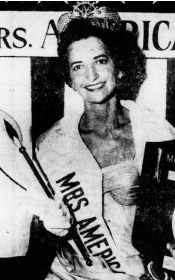
Pittsburgh Post-Gazette, July 21, 1956, p. 9.
Cleo Nicki Maletis was born in Saskatoon. She was the daughter of Tom and Pagoula Michas. In 1956, after marrying Chris Malitis Jr. and relocating to Portland, Oregon, she won the Mrs. America contest. This was a challenging five-day competition of cooking, sewing, and housecleaning skills, in addition to personality and appearance. The award provided an opportunity for her to tour the United States and Europe, including visiting her family in Greece.
The following newspaper article from the May 25, 1957, edition of the Saskatoon StarPhoenix describes her visit to Greece:
Meeting her aunts, uncles, and cousins in far-off Greece was another thrilling experience for Mrs. Chris Maletis, Jr., of Portland, Oregon, the former Cleo Michas, who was born in Saskatoon, and chosen last year as “Mrs. America 1956-57” in a nation-wide contest in the United States. While she was honored and feted on numerous occasions and in all parts of the country, her most exciting moment came when she and her husband stepped off the plane at Athens to be greeted by a welcoming committee of relatives. The only one missing, she wrote in the Oregon Journal Northwest Living Magazine, was 90-year-old Sophía Maletis, her husband’s grandmother, and she was waiting for them at a hotel.
Two weeks were spent in their parents’ native land and all the days were busy visiting relatives, sightseeing, or keeping countless appointments.
A typical series of such events read like this: An interview with Mrs. Vlahos, editor and publisher of the country’s leading magazine; a visit with the prime minister; a reception by the board of the YWCA, which included representatives from the press and all Greek women’s organizations; a tour of the YWCA building; a visit to “Metera” (mother), Her Majesty Queen Fredericka’s baby centre for the welfare of children deprived of normal homes; a visit to a branch of the Royal National Institute for the study of Greek moral, social, educational and living standards; a visit to the American embassy for a chat with Mr. Ambassador Allen; a visit with Sophocles Venizelos (former Greek prime minister); and a meeting with the Most Rev. Coucouzes, metropolitan of Melita and Greek Orthodox representative to the World Council of Churches at Geneva.
But Mr. and Mrs. Maletis motored through the countryside and into little villages. One day was spent in Kaparelli, where one lived, she wrote, in a different world. Women were busy spinning, weaving, and dyeing their linens. Washday meant a trip to the river and coffee prepared on a kerosene burner, while the Sunday dinner was prepared, then sent to the village baker, who baked it, along with other family dinners, at a nominal fee. While many of these folk lived in poverty, according to modern standards, they were rich in spirit. They had magnificent pride and dignity, and their hearts were full of generosity and hospitality.
As one of her cousins said when Mrs. Maletis left, “Do not pity or cry for us we have much to be thankful for. We are landowners, we raise our food, and we have plenty to eat, We do not have luxuries, but you can see how happy we are.”
Mrs. Maletis wrote that the Athenians were most friendly to visitors. In cities and countries alike, she had found a feeling of the people’s heartfelt gratefulness to America for financial aid and technical assistance so generously given to Greece. Its current relative prosperity gave testimony to the courage and hard-working capabilities of the Greek people who had suffered from 10 years of war and destructive civil strife.
The trip to Greece was only a part of the 150,000-mile goodwill tour made by “Mrs. America” and her husband to Europe. The attractive young homemaker has made hundreds of talks during the year and visited eight countries, but one of the unexpected thrills came when she was invited to address both the house and the senate in the capital at Salem, Ore., her hometown state. Mr. and Mrs. Maletis drove down from Portland in Cleo’s white car with “Mrs. America” painted on its side. She told her audience that homemaking was the basis of a great nation and that she stood for the home. “No matter where our paths lead us, we have a daily duty and obligation to keep America strong and free and in turn help to lead the world into everlasting freedom and peace,” said the young matron, who was introduced by Senator Boyd Overhulse, president of the senate.
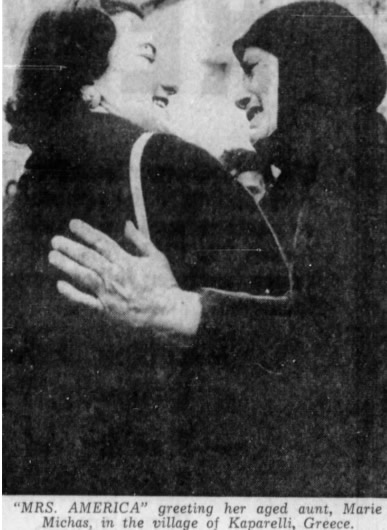
Saskatoon Star-Phoenix, May 25, 1957, p. 8.
Metrakos, Katherine (Chrones)
Katherine (Chrones) Metrakos
Katherine (Chrones) Metrakos was born in Weyburn and moved with her family to Saskatoon in 1930. She received a Bachelor of Arts degree from the University of Saskatchewan in 1945 and a medical degree from McGill University in 1949.
She married Julius Metrakos and together, they gained international recognition for their genetic research and academic articles on the causes of epilepsy. They received several awards, including the Penfield Award from the Canadian League Against Epilepsy (1987), Hellenic Benevolent Society Award (1992), and an award from the World Federation of Neurology (1994).
Ms. Metrakos served as director of the Neurophysiology Laboratory and founder of the Convulsive Disorder Clinic at the Montreal Children’s Hospital. The Laboratory is now named after her.
Pontikes, Kenneth Peter
Awarded in 1999:
Kenneth Peter Pontikes
The Order of the Phoenix is awarded by the Presidency of the Hellenic Republic to Greeks and foreigners who have distinguished themselves in the fields of public administration, science, arts and letters, commerce, industry, and shipping. It is also conferred on foreigners who have contributed to improving Greece’s stature abroad in these fields.
Two Greek Canadians from Saskatchewan have been honoured as officers of the Order of the Phoenix.
Ridis, Chris
Chris Ridis
Chris Ridis emigrated to Saskatoon from Greece in 1958. Trained in Europe and North America, he entered many international hair-styling competitions and returned with many trophies in recognition of his talents. He practiced his profession in Saskatoon at the Marvel Beauty Salon and later, at his own salon, Coiffures by Chris.
In 1961, during the New York International Beauty Show, he was awarded the Master Trophy in Hair Shaping and the World Supreme Trophy in Permanent Waving. During the 1960s, he was one of ten members of the Canadian National Hair Fashion Committee.
Photo Source: Saskatoon Star-Phoenix, March 18, 1961
Kelles,(Kelesides), Louis Paul
An Archon is an international honour extended to individuals by the Ecumenical Patriarch of the worldwide Orthodox Christian Church. The title recognizes outstanding service to the Church. It is given to individuals who are distinguished and respected leaders of the Greek Orthodox community.
In 1969, Louis Kelles travelled to Constantinople (Istanbul), Turkey, where he was awarded the title of Archon from His Eminence, Patriarch Athanagoras of the Greek Orthodox Church. Mr. Kelles is one of three current or former Saskatchewan residents who have received this honour.
Source: Sacramento Bee, Sacramento, California, October 31, 1989, p. 24.
